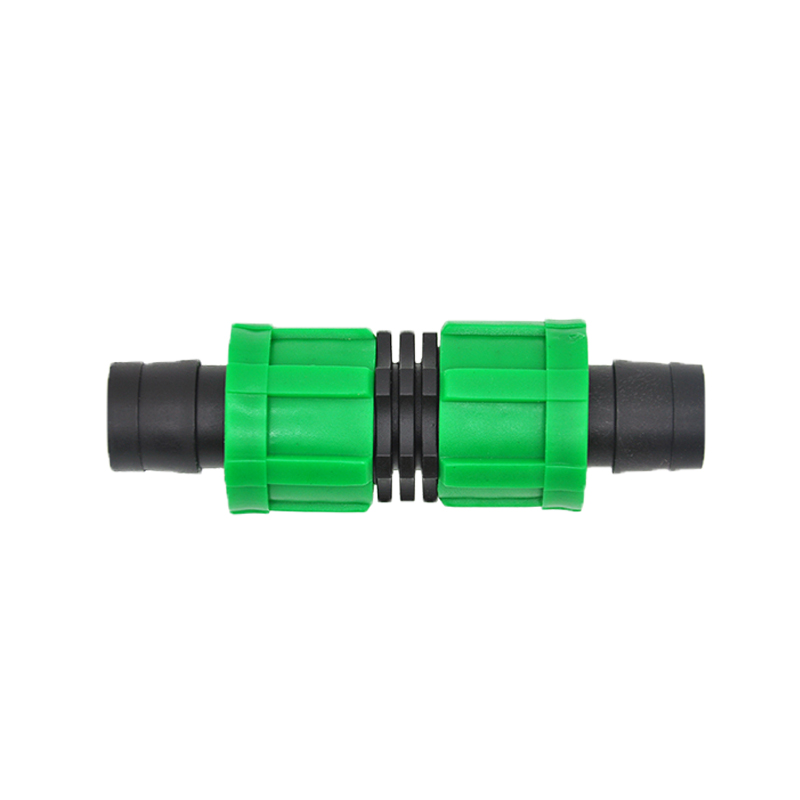A lock nut fitting for drip tape is a specific type of connector used in drip irrigation systems. It differs from other types of irrigation connectors in the way it secures and seals the connection between the drip tape and the supply line.
Here are the key characteristics and differences of a lock nut fitting:
Design: A lock nut fitting typically consists of two main components: a lock nut and a barbed connector. The lock nut is a threaded collar that screws onto the supply line, while the barbed connector has barbs that facilitate a secure connection with the drip tape. The design of the lock nut fitting allows for a tight and leak-free connection.
Secure Connection: The lock nut fitting provides a secure connection between the drip tape and the supply line. The lock nut creates a firm grip when tightened, ensuring that the drip tape remains securely attached to the fitting. This prevents accidental disconnection or leakage, even under pressure or in high-flow conditions.
Easy Installation: Lock nut fittings are relatively easy to install. The barbed connector is inserted into the end of the drip tape, and the lock nut is tightened onto the supply line, Lock Nut Fitting For Drip Tape compressing the drip tape against the barbs. This creates a tight seal and holds the drip tape in place.
Compatibility: Lock nut fittings are designed specifically for use with drip tape, which is a thin-walled, cylindrical tubing used in drip irrigation systems. The barbed connector of the lock nut fitting is sized to match the inner diameter of the drip tape, ensuring a proper fit and seal. It is important to select lock nut fittings that are compatible with the specific size and type of drip tape being used.
Reusability: In some cases, lock nut fittings can be reused if the drip tape needs to be repositioned or replaced. By unscrewing the lock nut, the drip tape can be disconnected from the fitting without damaging the components. However, it is essential to check the condition of the fitting and ensure a proper seal when reusing it.
Overall, lock nut fittings provide a secure and leak-free connection between the drip tape and the supply line in drip irrigation systems. Their design and functionality are specifically tailored to meet the requirements of connecting and sealing drip tape, making them a popular choice for drip irrigation installations.
What are the typical materials used in manufacturing lock nut fittings for drip tape?
Lock nut fittings for drip tape are commonly manufactured using various materials that provide durability, resistance to corrosion, and compatibility with irrigation systems.
The typical materials used in manufacturing lock nut fittings include:
Polyethylene (PE): Polyethylene is a popular material for lock nut fittings. It is lightweight, durable, and resistant to chemicals and UV radiation. PE lock nut fittings are commonly used in drip irrigation systems due to their affordability and compatibility with polyethylene drip tapes.
Acetal (Polyoxymethylene): Acetal is a thermoplastic material known for its high strength, stiffness, and resistance to wear and chemicals. Lock nut fittings made from acetal provide excellent durability and are suitable for use with various types of drip tapes.
Polypropylene (PP): Polypropylene is a versatile thermoplastic material that offers good chemical resistance and durability. PP lock nut fittings are commonly used in drip irrigation systems, as they provide a reliable and long-lasting connection with drip tapes.
Nylon: Nylon is a strong and durable synthetic material that is resistant to wear, chemicals, and temperature variations. Nylon lock nut fittings are suitable for demanding applications and can withstand harsh environmental conditions.
Brass: While less common than plastic materials, brass lock nut fittings are sometimes used in drip irrigation systems. Brass provides excellent durability and corrosion resistance. However, brass fittings are typically more expensive than plastic alternatives.
It’s important to note that the specific material used for lock nut fittings may vary among manufacturers and regions. When selecting lock nut fittings, consider the compatibility of the material with your drip tape, the environmental conditions of your irrigation system, and the desired longevity of the fittings.
Additionally, it’s always recommended to follow the manufacturer’s guidelines and recommendations regarding material compatibility and usage to ensure a proper and leak-free connection in your drip irrigation system.
